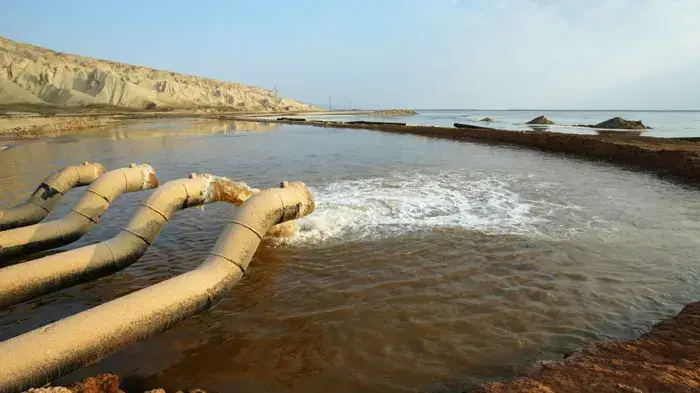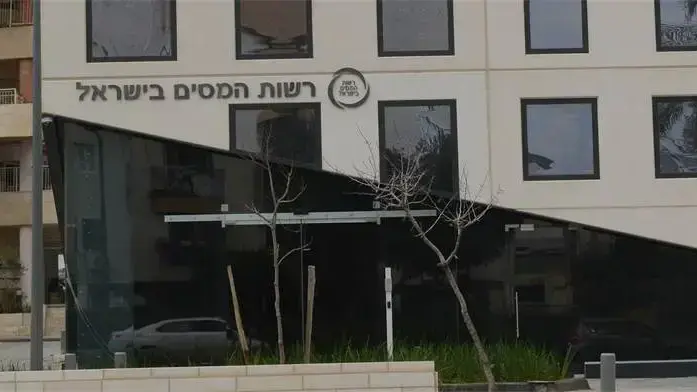The Tax Authority en route to ICL legislation is also considering legal proceedings
Finance Ministry is furious with ICL: The mole for 2018 includes accounting exercises that save it from paying tax to the wealth fund
Dead Sea Works (Photo: Image Bank GettyImages)
Dead Sea Works (Photo: David Silverman, GettyImages)
The Tax Authority is expected to notify ICL of the deferral of tax assessments it has filed regarding its taxable over-profit tax, according to the Natural Resources Taxation Law. Globes has learned that the Authority is considering initiating legislative amendment to prevent container and other companies from carrying out asset revaluation accounting procedures, which could reduce hundreds of millions of shekels of tax payments to the wealth fund.
Government officials told the Globes that "there is almost a crossing of the criminal border." In their approach, the law is very clear and ICL violates it.
In the state authorities, there is an uprising on the position that ICL took in a report that it submitted regarding levy payments for natural resources. Critics say that the question of how to calculate the levy for natural resources has been raised many times in the Finance Committee and in other discussions between ICL and the state, and the state's position has been made clear to ICL's representatives time and time again. Still, ICL chose to take a different approach. ICL announced in response that it acts in accordance with the law and in full transparency with the Tax Authority and in general.
As Globes reported last week, revenues for the Hitali wealth fund that Shinsky is lower than expected and although the official deadline for starting the fund is still 2020, the fund is expected to reach the minimum threshold that will only allow it to operate in 2021. The Wealth Fund is supposed to absorb all of the tax revenue from surplus profits levied on gas and natural gas producers - a tax imposed following the recommendations of the Shasinsky Commission 1 (2011) and the Shasinsky 2 Committee (2014). The fund is expected to distribute 3.5% of its revenue each year for social, educational and economic purposes.
More in Walla! NEWS More in Walla! NEWSRevenue from taxing the Tamar stock is low and the money does not reach the public
To the full articleExcessive income tax does not reach the wealth fund
In the event of an over-the-world tax on natural treasures, the state expected to receive income of NIS 400 million, for its over-profit on potash production and other natural treasures.
ICL was due to start paying the tax in 2016 and has filed tax assessments every year since. However, as part of its annual financial statements for 2018, the company announced that it had no tax liability at all - in the light of an appraiser's opinion, which states that its fixed asset value ("the cost of the replacement") is $ 6 billion - much higher than the state assumed in its calculations. The company noted in its financial statements that "there is no tax liability for over-the-counter tax," but added that "the position of the tax authority may differ materially and even in substantial amounts as a result of a different interpretation of how the law is implemented."
The company added that "as the aforementioned tax position is rejected by the tax authority, the result will be an increase in tax liabilities by an aggregate amount of $ 100 million for 2016-2018." However, ICL estimated that "the likelihood that the company's position would be accepted outweighed the likelihood of being rejected" and set aside funds for the tax companies accordingly.
However, it turns out that the state does not share ICL's optimistic assessment. Government officials told "Globes" that ICL had no place to interpret the law in the way it interpreted it and even defined its interpretation as "an act that will not be done." Against the background, the same officials said that the tax authority would act to collect the tax that comes to the state, which stands at about NIS 400 million.
At the same time, "Globes" learned that as part of internal discussions with the tax authority and the Treasury, the possibility of initiating legislative amendments is also being considered, as other companies, from the gas production sector, have presented property valuations.
The Natural Resources Taxation Law was enacted following the recommendations of the Shinsky 2 Commission of 2014. As part of the interim report, the Commission recommended imposing an over-profit tax on the production of natural resources. The tax recommended by the committee in the interim report at 42% should have been levied on any shekel in excess of basic profit, equal to 11% of the company's fixed assets.
In the final report of the commission, the taxpayer twice doubles: the tax threshold was raised to 14% of the value of fixed assets and the tax rate was split to a level of 25% on profit between 14% and 20% of the value of fixed assets, and a tax on 42% on profit over 20% of the property. The permanent.
As a result of these changes, the state has reduced its projections for projected tax revenues - from NIS 500 million to only NIS 400 million. Despite the softening of the recommendations, ICL petitioned the High Court, but the recommendations were approved by the government in November 2014.
Thus, ICL's tax liability disappeared
ICL's tax liability has disappeared (Photo: Globes, PR)
The tax exercise behind asset revaluation
ICL's tax will come up for judicial review later, assuming that the Tax Authority will issue ICL orders for the tax payment that was allegedly deducted from the state due to ICL's calculation.
The Tax Authority's position is not at all possible to calculate the levy under the Natural Resources Taxation Law on the basis of asset revaluation (the revaluation method or the fair value method). This route, it is argued, is irrelevant to the levy.
According to a treasury official, "We have more disputes with natural resource earners. All the gas partnerships are causing us problems. This is also part of the reasons for the Natural Resources Fund's rejection - rejecting some of the tax authority's companies' reports and tax disputes with the companies that benefit from the natural resources. This is true for the gas partnerships and it is true for ICL ICL have taken an extreme position that it will be difficult for them to face the tax authority, and the companies are trying to avoid the royalties to the point of ignoring what was decided in the Finance Committee and the Gibraltar Legislature. To avoid paying Tax. The gas companies generally and challenge us, and others. Peekaboo and gas companies, ICL has taken a very aggressive position, but the state will not give up. "
The tax authority said in response: "Due to the duty of confidentiality we are prevented from addressing."
More in Walla! NEWS More in Walla! NEWSWhere can I still get a rental property in Israel at a reasonable price?
Home Real Estate GRP
To the full articleOf what many royalties and how much are they worth?
■ What is the argument about?
ICL's tax model is based on the value of the company's assets, which are used to generate natural resources. ICL claims that the law allows it to estimate the value of the assets ("the cost of calculating invested capital" in the accounting jargon) in accordance with the IFRS method, that is, by their fair value. The state says that the only way to estimate the value of the assets is in accordance with the historical value.
The differences between the approaches are dramatic - for ICL its important tax approach is zero, while ICL's state approach is expected to pay approximately NIS 400 million for 2016-2018 alone.
■ What is a Shinsky 1 tax?
As a result of the gas discoveries and expected profits for the entrepreneurs, the state decided to impose a tax so that the public would receive a greater share of revenue from the sale of the national resource. A public committee appointed by then Finance Minister Dr. Yuval Steinitz led by economist Prof. Eitan Shinsky recommended that, in addition to royalties and corporate taxes, over-profit tax levy be levied on gas producers 20% -50% (in fact 45%). The committee's recommendations were approved by law in 2011 .
In fact, gas producers pay the tax only after earning over 150% - 200% of their investment in discovering and developing the reservoir.
The Tamar reservoir, the first large reservoir developed since the law was enacted, is expected to start paying tax in July 2020.
■ What is Shinsky 2 tax?
After the taxation was imposed on gas resources, it was decided to extend the taxation to other natural resources, most notably the potash and phosphates that the ICL Group produces from the Dead Sea. In 2014, the Shinsky Second Commission recommended that over-the-counter taxes be levied on natural resources.
ICL, the almost single factor on which the tax is imposed - objected to its imposition. Likud officials, local government and the prime minister's environment have warned that the tax levy would result in a loss of billions of dollars in the Negev - but the tax was eventually approved under the Arrangements Law 2015-2016 thanks to Finance Minister Moshe Kahlon's window and Budget Controller Amir Levy. ICL was able to significantly soften the final wording of the tax, as opposed to the one proposed by the committee.
■ What is the Wealth Fund?
Taxes paid by gas producers and natural resources for their over-profits should be accrued to the Fund for Citizens of Israel, a national wealth fund that is supposed to secure funds for future generations, but will also be able to distribute 3.5% of its revenue each year for social and educational purposes. The fund is set to start with NIS 1 billion in cash. To date, this amount will only be reached in 2021 later than initially anticipated. However, according to the latest projections, the fund is expected to accrue NIS 250 billion over the next few decades.









